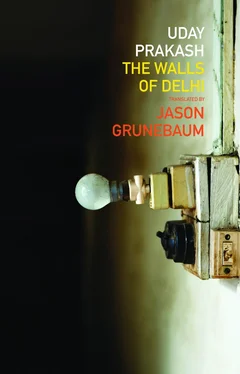It was in the Star Computer Centre that Mohandas met Harshvarddhan Soni. He’d come there to have some photocopies made for his legal practice, and to have some letters typed. By then, Mohandas was a fast typist and made few mistakes. He told his whole story to Harshvarddhan right then and there.
Toward the latter part of the twentieth century, I’d spent a couple of decades as an active member of a particular ideological political party; Harshvarddhan Soni had been in the same party. His life had also been full of the same struggles and sorrows, victories and defeats. The son of a woman who was a middle school teacher, Harshvarddhan was, from the beginning, independent-minded and quite perceptive. His older brother, Srivarddhan Soni, had come in first in his BA class for engineering; despite the degree, however and after the joblessness got worse and worse, one night, five years ago, he’d tied a rope to the ceiling fan and hanged himself. The tragedy of his brother’s suicide made such a deep impact on Harshvarddhan, son of a shopkeeper and middle school teacher, that even during his studies he began participating in the student wings of political organisations. He married outside of his caste, and was punished for doing so by being expelled from it.
Harshvarddhan Soni then earned an LLB and made his living working alongside his party in the local court on legal matters. When Mohandas told him the story that day at the Star Computer Centre — it wasn’t really a story, but a real account of a living life — he decided to take his case and seek redress in court.
‘How much money do you have at the moment?’ Harshvarddhan asked, looking at Mohandas’s patched-up shirt and washed out jeans. ‘I’ll take your case, and you will receive justice.’
Mohandas’s eyes lit up, and his frail body began trembling. For an instant he didn’t believe that it was possible someone would aid him like this.
‘Right now I have eighty rupees,’ he answered. ‘In a few days I’m supposed to get forty more. And Imran pays me a couple of hundred in wages.’
Harshvarddhan calculated that Mohandas at most could be counted on for five hundred a month, while it took in the vicinity of five thousand in court fees just to have the case heard. The economic policies of one government after the next transformed India’s big cities into little Americas, while putting people who lived in the same country into the poorhouse, but in tiny villages and undeveloped places, and creating countless Ethiopias, Ghanas, and Rwandas. A professor who toed the ideological line of a connected political party made around fifty thousand a month in Delhi-Lucknow, Mumbai-Bhopal, Kolkata-Patna, and a no-name freelancer could expect five hundred to a thousand rupees for a two page piece; but the hardworking, industrious Mohandas, from the wrong side of the tracks from a forgotten village, and those like him, took a whole month to scrape together four hundred.
Harshvarddhan realised that he himself would have to find the funds if Mohandas were to have his day in court. He put in a thousand of his own money, asked friends for another two thousand, and got the rest from the charity fund of the Lions Club — in other words, he was able to get the cash.
Slowly but surely, one way or another, judge (first class) Gajanan Madhav Muktibodh, who preferred his bidis to smoking cigarettes, who was thin as a stick, whose bony cheeks jutted out, whose brow was scored with countless wrinkles, agreed to hear the case of Mohandas in his court of law.
Mohandas, s/o Kabadas, caste Vishwakarma, r/o Purbanra, district Anuppur, M.P. versus Vishwanath, s/o Nagendranath, caste Brahmin, r/o Bichiya Tola, currently r/o A/11 Lenin Nagar, Oriental Coal Mines, district Durg, Chhattisgarh.
The moment the court went into session, S.K. Singh, the chief executive of the Oriental Coal Mines, along with welfare officer A.K. Srivastav, along with other senior executives, were summoned before the court to testify and explain how and why it was that the man who had been working for five years as deputy depot supervisor known as Mohandas Vishwakarma was, in fact, Vishwanath (s/o Nagendranath, r/o Bichiya Tola).
Judge Gajanan Madhav Muktibodh ordered the district magistrates of Anuppur and Durg to launch an official enquiry into the matter and instructed them to report their findings to the court within two weeks’ time.
The court order and summons by bidi-smoking judge G.M. Muktibodh created chaos in the Oriental Coal Mines. The local newspapers ran the headline: WHO IS THE REAL ‘MOHANDAS’?
Anil Yadav and Khalid Rashid — local reporters for NDTV and Aajtak national news channels — sent clips of the story to Delhi and Bhopal, but it didn’t fit into the ‘National Scene’ or ‘Indian Panorama’ segments, and didn’t even made the ‘Regional News’ because the story didn’t include any big politicians or bigwigs from the big cities of Delhi-Bhopal-Lucknow.
(This is a story from the time when Vidhu Vinod Chopra’s ‘Munna Bhai MBBS’ was making a killing at the box office. George Bush and Tony Blair had both been re-elected and were returned to power, and Saddam Hussein, his beard giving him the look of a crazed fakir, face covered with wrinkles, was writing poetry in an American prison, and former Indian Prime Minister V.P. Singh, who instituted the recommendations of the controversial Mandal Commission that set aside job and school slots for the lower-castes, was diagnosed with cancer, his kidneys were failing, he was on dialysis — just like J.P. had been — and was quietly painting oil canvases in a corner of Delhi.
It was the time when the district collector from Patna, Bihar — Gautam Goswami — whose photo was on the cover of Time as a hero when the big floods hit that year, later made off with tens of millions of rupees from the flood fund; and it was the time when the new government constituted a new film censor board, and placed at its helm a nawab from a royal family, former captain of the Indian cricket team, but who was unable to delete a scene in a film where he was caught red-handed hunting the endangered black buck and other animals…
It was the time when for fifteen years running each and every vacant position connected with a Hindi language post was filled with a son, a son-in-law, a daughter, a father-in-law, an arse kisser, or a right-hand man of a search committee member, right out in the open, without shame, without any CBI inquiry or any questions asked in the Rajya Sabha or Lok Sabha.
It was a time when the Human Resources Minister had transformed the public sector into a machine for corruption that churned out thinkers, pedagogues, sociologists, novelists, historians, intellectuals, artists, teachers… and the political battle to capture the minds and hearts of the youngsters was on, by endlessly re-writing and re-re-writing history texts and schoolbooks.
It was the time when India ranked seventh among the world’s most corrupt countries, sixth among nuclear-armed nations, second in population, while in poverty Bangladesh was at the top.)
Both Harshvarddhan Soni and Mohandas were confident that the court of the judge G.M. Muktibodh would separate milk from water and sort out right from wrong. They were confident for two reasons. The first was based on the fact that the magistrate smoked bidis and drank strong chai from the streets, and there was no sign at all he was looking to have his palms greased. The man was not corrupt.
The second reason was that truth was in Mohandas’s corner: he was the real Mohandas, BA.
‘These lies will come crashing down like a house of cards! Like the light of dawn, all will be revealed! Victory to Malihamai! Please let it be so, Kabirguru!’ Kasturi’s gloomy life was once again sprouting shoots of hope. Though Putlibai’s blindness had grown even more severe since Kabadas’s death, she still sat on an old mat in the corner, like an ancient hawk with clipped wings, her ear forever trained toward the inner rooms of the house.
Читать дальше










